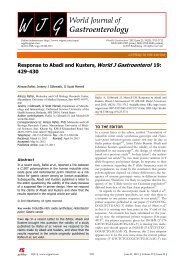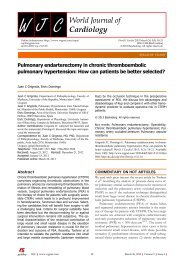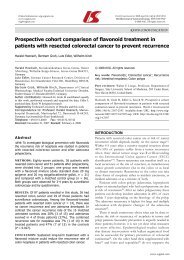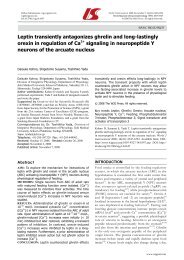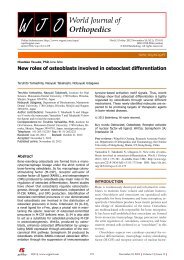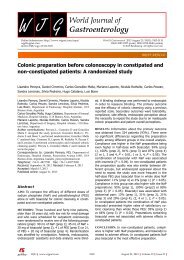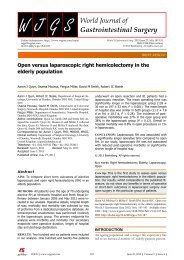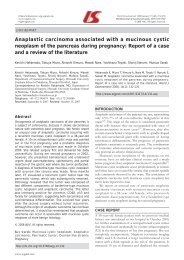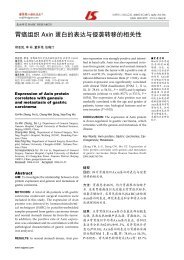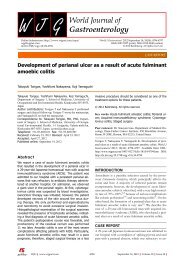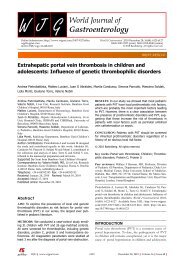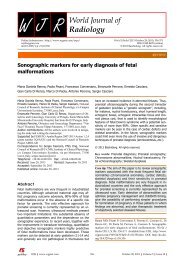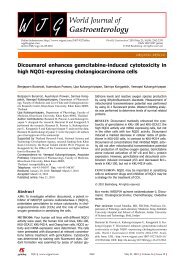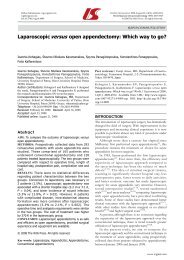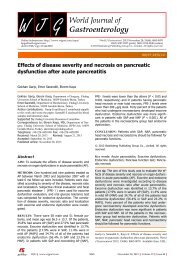18 - World Journal of Gastroenterology
18 - World Journal of Gastroenterology
18 - World Journal of Gastroenterology
Create successful ePaper yourself
Turn your PDF publications into a flip-book with our unique Google optimized e-Paper software.
Ji L et al . Beta-catenin associated with prognosis <strong>of</strong> esophageal carcinoma 2625<br />
be a good guide for choosing the modalities <strong>of</strong> adjuvant<br />
therapy. In early ESCC patients with beta-catenin level 1<br />
expression, a favorable outcome could be expected. Since<br />
lymph node metastasis was observed in only 20% <strong>of</strong><br />
these patients, reduction surgeries might be considered,<br />
particularly for those in a poor general condition or with<br />
small tumors. In contrast, patients with level 2 ESCC and<br />
advanced stage disease might have a dismal prognosis, and<br />
the introduction <strong>of</strong> intensive adjuvant therapies for these<br />
patients might be justified.<br />
In conclusion, beta-catenin mRNA expression level is<br />
a new prognostic marker for ESCC. The stratification <strong>of</strong><br />
ESCC patients based on the disease stage and beta-catenin<br />
expression level is valuable for predicting tumor recurrence<br />
and prognosis. This system might provide a novel way to<br />
explore effective treatment modalities for ESCC.<br />
REFERENCES<br />
1 Dawsey SM, Wang GQ, Weinstein WM, Lewin KJ, Liu FS,<br />
Wiggett S, Nieberg RK, Li JY, Taylor PR. Squamous dysplasia<br />
and early esophageal cancer in the Linxian region <strong>of</strong> China:<br />
distinctive endoscopic lesions. <strong>Gastroenterology</strong> 1993; 105:<br />
1333-1340<br />
2 Faivre J, Forman D, Esteve J, Gatta G. Survival <strong>of</strong> patients with<br />
oesophageal and gastric cancers in Europe. Eur J Cancer 1998;<br />
34: 2167-2175<br />
3 Eloubeidi MA, Desmond R, Arguedas MR, Reed CE, Wilcox<br />
CM. Prognostic factors for the survival <strong>of</strong> patients with<br />
esophageal carcinoma in the US.: the importance <strong>of</strong> tumor<br />
length and lymph node status. Cancer 2002; 95: 1434-1443<br />
4 Greenlee RT, Hill-Harmon MB, Murray T, Thun M. Cancer<br />
statistics, 2001. CA Cancer J Clin 2001; 51: 15-36<br />
5 Ueyama T, Kawamoto K, Yamada Y, Masuda K. Early<br />
esophageal carcinoma. Evaluation <strong>of</strong> the depth <strong>of</strong> invasion<br />
based on double-contrast esophagography. Acta Radiol 1998;<br />
39: 133-137<br />
6 Lambert R. Diagnosis <strong>of</strong> esophagogastric tumors. Endoscopy<br />
2002; 34: 129-138<br />
7 Nozoe T, Saeki H, Ohga T, Sugimachi K. Clinicopathological<br />
features <strong>of</strong> early esophageal squamous cell carcinoma with<br />
subsequent recurrence. Dis Esophagus 2002; 15: 145-148<br />
8 Lam KY, Tsao SW, Zhang D, Law S, He D, Ma L, Wong J.<br />
Prevalence and predictive value <strong>of</strong> p53 mutation in patients<br />
with oesophageal squamous cell carcinomas: a prospective<br />
clinico-pathological study and survival analysis <strong>of</strong> 70 patients.<br />
Int J Cancer 1997; 74: 212-219<br />
9 Sanders DS, Bruton R, Darnton SJ, Casson AG, Hanson I,<br />
Williams HK, Jankowski J. Sequential changes in cadherincatenin<br />
expression associated with the progression and<br />
heterogeneity <strong>of</strong> primary oesophageal squamous carcinoma.<br />
Int J Cancer 1998; 79: 573-579<br />
10 Bian YS, Osterheld MC, Bosman FT, Fontolliet C, Benhattar J.<br />
Nuclear accumulation <strong>of</strong> beta-catenin is a common and early<br />
event during neoplastic progression <strong>of</strong> Barrett esophagus. Am<br />
J Clin Pathol 2000; 114: 583-590<br />
11 Wijnhoven BP, Nollet F, De Both NJ, Tilanus HW, Dinjens<br />
WN. Genetic alterations involving exon 3 <strong>of</strong> the beta-catenin<br />
gene do not play a role in adenocarcinomas <strong>of</strong> the esophagus.<br />
Int J Cancer 2000; 86: 533-537<br />
12 Gonzalez MV, Artimez ML, Rodrigo L, Lopez-Larrea C,<br />
Menendez MJ, Alvarez V, Perez R, Fresno MF, Perez MJ,<br />
Sampedro A, Coto E. Mutation analysis <strong>of</strong> the p53, APC,<br />
and p16 genes in the Barrett’s oesophagus, dysplasia, and<br />
adenocarcinoma. J Clin Pathol 1997; 50: 212-217<br />
13 Sheng H, Shao J, Williams CS, Pereira MA, Taketo MM,<br />
Oshima M, Reynolds AB, Washington MK, DuBois RN,<br />
Beauchamp RD. Nuclear translocation <strong>of</strong> beta-catenin in<br />
hereditary and carcinogen-induced intestinal adenomas.<br />
Carcinogenesis 1998; 19: 543-549<br />
14 Hourihan RN, O’Sullivan GC, Morgan JG. Transcriptional<br />
gene expression pr<strong>of</strong>iles <strong>of</strong> oesophageal adenocarcinoma and<br />
normal oesophageal tissues. Anticancer Res 2003; 23: 161-165<br />
15 Kimura Y, Shiozaki H, Doki Y, Yamamoto M, Utsunomiya T,<br />
Kawanishi K, Fukuchi N, Inoue M, Tsujinaka T, Monden M.<br />
Cytoplasmic beta-catenin in esophageal cancers. Int J Cancer<br />
1999; 84: 174-178<br />
16 Roh H, Green DW, Boswell CB, Pippin JA, Drebin JA.<br />
Suppression <strong>of</strong> beta-catenin inhibits the neoplastic growth <strong>of</strong><br />
APC-mutant colon cancer cells. Cancer Res 2001; 61: 6563-6368<br />
17 Green DW, Roh H, Pippin JA, Drebin JA. Beta-catenin<br />
antisense treatment decreases beta-catenin expression and<br />
tumor growth rate in colon carcinoma xenografts. J Surg Res<br />
2001; 101: 16-20<br />
<strong>18</strong> Yan YX, Nakagawa H, Lee MH, Rustgi AK. Transforming growth<br />
factor-alpha enhances cyclin D1 transcription through the binding<br />
<strong>of</strong> early growth response protein to a cis-regulatory element in the<br />
cyclin D1 promoter. J Biol Chem 1997; 272: 33<strong>18</strong>1-33190<br />
19 Jaattela M. Programmed cell death: many ways for cells to die<br />
decently. Ann Med 2002; 34: 480-488<br />
20 Chen S, Guttridge DC, You Z, Zhang Z, Fribley A, Mayo MW,<br />
Kitajewski J, Wang CY. Wnt-1 signaling inhibits apoptosis by<br />
activating beta-catenin/T cell factor-mediated transcription. J<br />
Cell Biol 2001; 152: 87-96<br />
S- Editor Liu Y L-Editor Wang XL E- Editor Wang HF<br />
www.wjgnet.com



